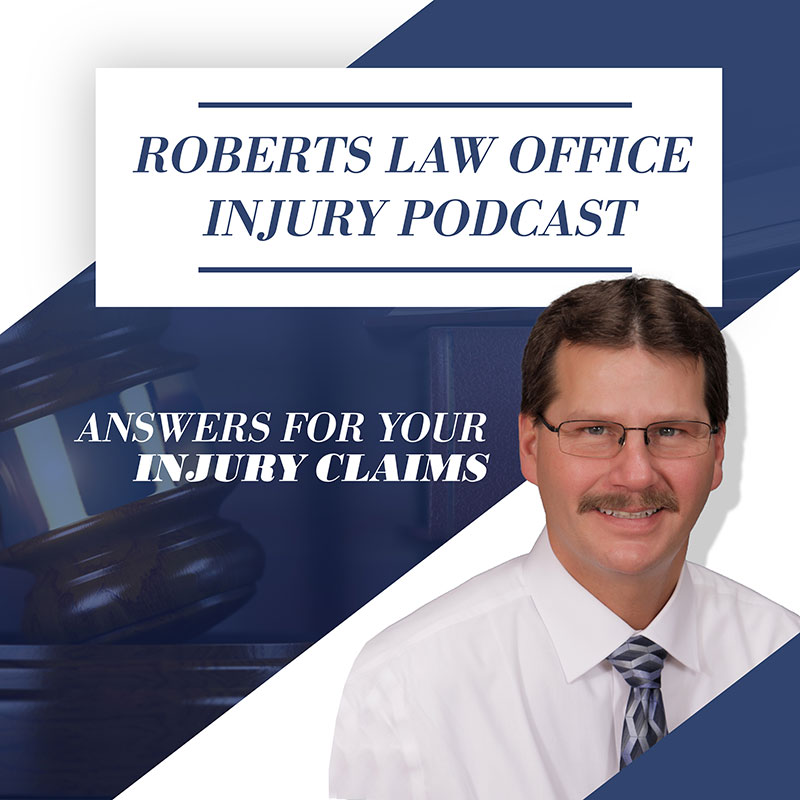Episode 5: Calloway County personal injury attorney Jeff Roberts is joined by his daughter, Clarissa Roberts. Clarissa recently completed her 2nd year at the University of Louisville Brandeis School of Law. The Kentucky Justice Association (KJA) recently published an article written by both Jeff and Clarissa on the topic of the wording of personal injury settlement releases.
KJA is an association of approximately 1,400 Kentucky trial attorneys who come together to discuss important topics, lobby for change on a statewide and national level and educate its members so they can improve their trial skills to better represent clients. KJA has a publication called, The Advocate.
A release is a contract signed at the end of litigation, which terminates the litigation against the at-fault party (the defendant or defendants). Typically, a financial settlement has been reached. At this time, the release prevents the injured party (the plaintiff) from pursuing the other party for further restitution.
Your attorney needs to carefully review and explain the terms of the release. Once this contract is signed, the will be no opportunity for you to go back for additional funds/compensation. Often, future medical expenses may have already been calculated and included in the settlement. This is a reason an injured person should not rush to settle a case. Until the full extent of the injuries are known, it’s difficult to determine to proper value of a case. Multiple surgeries and other treatments may be required. If you were to sign a release too early in the process, you may be on your own regarding paying for the medical expenses.
The wording of the releases can often be complicated. There may be some specific language and technicalities that could either let someone off the hook without you realizing it, or even to expose you to having to pay back your insurance company more that you thought you might have to repay. These are contracts that need to be carefully understood before you sign them. It’s an important reason to have an attorney work through the specific clauses.
It’s important to remember that an attorney can generally handle various types of cases. While some attorneys focus or concentrate their practices in certain areas of law, they still may be licensed to handle many types of legal matters. However, unless an attorney handles specific types of contracts on a regular basis, he/she may not fully recognize the significance of certain language.
The Global Release
This clause or language can actually release everyone from the damages. It’s possible your release has a clause that can be confusing. For instance, if you were in a car wreck and your air bag failed to deploy, there could be a products liability claim. However, if this section of the release isn’t properly examined and potentially modified, you might inadvertently release the manufacturer from its liability.
Vicariously Liable Defendants
This language could be used to release an employer for the actions of an employee. For example, if a truck driver crossed the center line and crashed into your car, the truck driver and the trucking company should be held liable. If your contract includes this language, it could release the trucking company from its responsibility. This is important when an employee drives his/her own vehicle on company business. It may be proven that the employer should also be held liable. This is extremely important if the driver’s own insurance policy coverage is very low compared to the amount of the medical bills and other damages.
Indemnity Clauses
This clause is when you’ve agreed to protect someone from someone else making a claim against them. In personal injury cases, this often comes up with medical bills. If you are injured in an accident, and Medicare has stepped in to pay a medical bill, the at-fault driver may want to use the indemnity clause to ensure Medicare does not come back to them for reimbursement, once the settlement has been paid. The responsibility has shifted to the injured party now that they’ve received the funds. This is not limited to Medicare, but serves as an example.
For the plaintiff, indemnity language could limit you from pursuing additional sources of compensation from a specific party. This is one reason you really want understand which party/parties are being released. It the clause is worded too broadly, you may not be able to pursue another person/company.
Confidentiality Clauses
Many injury claims are settled and the injury settlement releases often include a confidentiality clause. The confidentiality clause protects the defendant and/or the plaintiff from disclosure of the amount of the settlement or other elements they may wish to keep confidential.
These clauses can have tax consequences. When a defendant wants a confidentiality clause, it’s not uncommon to negotiate an additional fee for doing so, as part of the overall settlement. Personal injury settlements are not taxable, but a fee for a confidentiality clause is taxable.
PIP Funds (Personal Injury Protection)
Kentucky is a no-fault state. You generally have a minimum of $10,000 in coverage, called personal injury protection (PIP coverage). Your settlement should be specifically exclusive of PIP. This makes sure you don’t have to repay the PIP funds. Technically, this already applies because we’re a no-fault state, but the clause should still be included.
UIM Release Clause
UIM stands for Underinsured Motorist coverage. This usually a coverage on your own automobile insurance that protects you when your damages exceed the amount of coverage the at-fault driver was carrying at the time of the collision. Unlike PIP, this coverage is not automatic.
When you accept the liability limits of the at-fault driver’s policy, there’s a specific process you must follow, when you plan on pursuing a UIM claim. A release may inadvertently release your own insurance company from its responsibility to pay your UIM claim. This could prevent you from collecting on the coverage you’ve been paying for over months or years.
Contract language is complicated. You should consult an attorney when you are asked to sign legal agreements. The wording of injury settlement releases can either protect you or cause you to give up your right to pursue further compensation, sometimes inadvertently.
For more information, visit www.JeffRobertsLaw.com. This podcast is meant to provide information and is not legal advice. Jeff’s principal office is located at 509 Main Street, Murray, Kentucky. Co-host Jim Ray is a non-attorney spokesperson. This is an advertisement.





